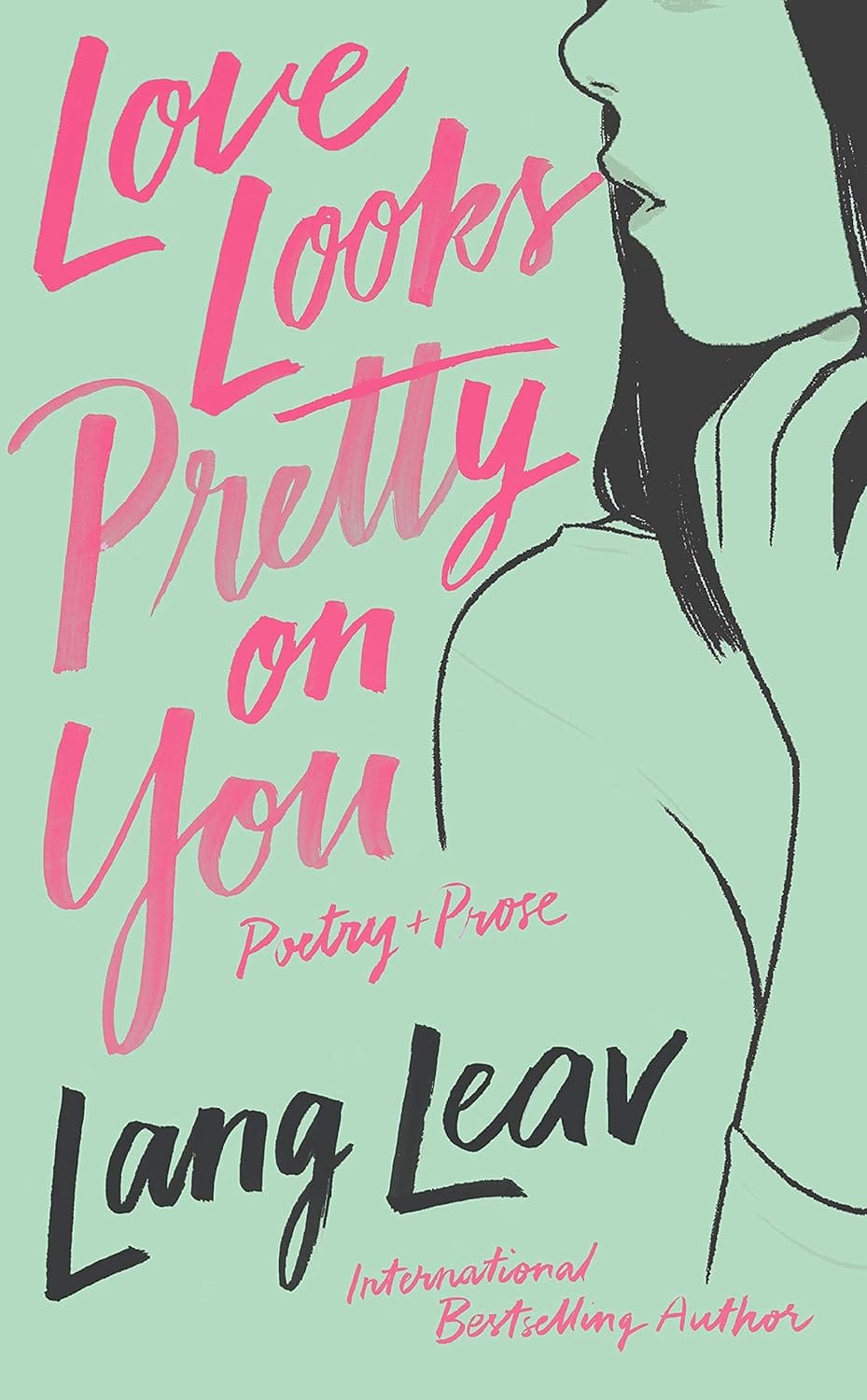Visceral and Villainous, and the Heartfelt and Heroic Lang Leav's Love Looks Pretty on You
by Blair E. Vandehey
Don’t be deceived by its cute name and soft cover art; though each verse is flowy and iridescent, Lang Leav’s sixth (and most feminine-oriented) poetry collection Love Looks Pretty on You isn’t afraid to tread into the murkiness of the human concept and bear its teeth towards adversary, be it outside or within.
Leav makes many things clear in Love Looks Pretty on You with her intense poetic voice, including who she wrote for; the book is a medium of connection to her many mothers and sisters, those she is related to and those she is not, those she is personally familiar with and those she will never know the names of. The distance between author and reader is quickly established to be nonexistent through Leav’s confiding voice, creating an atmosphere of a woman-to-woman fireside talk rather than a poetic work. Leav converses with the reader about the feminine experience in broad terms, be it navigating a male-defined world or celebrating the unmatched gift of female friendship in pieces like “Slut Shaming” and “The Friendship Bond.” Even when she speaks on her own experience, the reader can relate to them even if they had never been in the exact same situation. “Sydney, 2007” details younger Leav being slowly overcome by anxieties of walking home alone at night–“...keys splayed between my fingers” and “I should have left the party earlier” were especially potent images to me (and I’m sure are to many other young women). Likewise, an untitled work ruminates on her implicit guilt of realizing the life her mother sacrificed to give her, emulating in a personal story a specific and nuanced emotion many girls/women experience. Collective consciousness or personal anecdote, Leav taps into a mood in Love Looks Pretty On You that is particularly feminine–and particularly visceral.
For better or for worse, humans are not one-dimensional creatures. We contradict ourselves with complete sincerity. We everything and its distorted reflection. Leav, too, quickly proves herself a complicated individual in Love Looks Pretty on You. Unlike in many poetic collections, she makes no case for herself as the heroine of the story. Rather, she presents her poems as neutral evidence for us to draw our own conclusions about her, be it that she is a martyr standing against her circumstances, a self-immolating villainess, or somewhere in between as a human being with flaws. She lays her faults bare for the reader in declaring self-awareness at her toxic supplementation of her own absent self-love by that of her lovers in “Someone Else,” and giving a poetic middle-finger to being the bigger person in “Unforgiven.” For each one, she gives no justification as to why she might feel what she does, testifying only to being a victim of our condition; we won’t always have an explanation for our ills. Sometimes, they just are. Still, in embracing human complexity, she implicitly criticizes those who choose to view her only for her vices in poems like “Vultures:” poems speaking on the foolishness of only understanding her as either virtuous or viceful are interspersed between her more confessional ones. In doing this, Leav implicitly advocates for the third option–that each of us are both the martyr and the villain, the hero and the coward, and that is completely natural without any justification other than our own humanity.

The complicated atmosphere of Love Looks Pretty On You continues over into Leav’s relationship with her younger self, sometimes pushing her to the ground and jeering her weakness in self-loathing poems, at other times cooing pities to her skinned knees and helping her back up to prove she is still strong. Leav’s animosity comes out most blatantly in an untitled poem where our author grapples with her past self of who keeps a man they loved and “A Meeting of Selves” shows Leav walking towards Future Leav leaving Past Leav to perish in the wasteland of her bygone years. Other times, works like “Letter to the Past” details Leav extending a comforting embrace to her younger self and reaffirming that she did the best with what little she knew. With this contrasting opinion of Past Leav, our author characterizes her younger self on both sides of the innocent-naive coin, sometimes all at once. By the end of the book, Leav remains irresolute on her view of her, but the lack of answer serves to embolden the work’s complexity–like the martyr-villain spectrum, this will also never be one or the other and always be some mix of both.
Though the first (and titular) line of the book makes a statement–“Love Looks Pretty on You”–Leav’s searing prose transforms even uglier feelings–that of self-loathing, immaturity, and beyond–into something praiseworthy, awe-inspiring, and relatable in her readers, be it that of the human condition’s complexity or fellowship between women.
Blair E. Vandehey is an Appleton-based writer, daydreamer, and lover al all things pop culture. She is currently working towards degree in Creative Writing and Political Science at Lawrence University.




